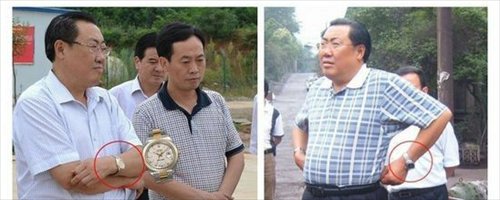Watch hunt

When local official Yang Dacai rushed to the scene of a fatal road accident to monitor rescue work in Yan'an, Northwest China's Shaanxi Province last week, he didn't expect he would soon be vilified by the public.
Pictures showing the potbellied official smiling in front of the wreckage of a double-decker sleeper bus that had crashed into a methanol-loaded tanker soon raised questions over how callous he could be, grinning at the loss of 36 lives.
That was just the beginning of the storm. In the ensuing cyber manhunt, an example of what are commonly known in China as "human flesh searches," enraged Web users not only discovered his position - director of the workplace safety inspection administration of Shaanxi - but also came across pictures of him wearing an expensive assortment of luxury watches.
The hunt begins
A group of pictures were posted online the day after the crash, which showed Yang wearing five different watches on different occasions, each bearing famous brands.
Sun Duofei, the chief operations officer at 5lux.com, a Chinese website that sells luxury products, published on Sina Weibo the evaluation results of the five watches by a watch expert.
The most expensive of the watches was a Vacheron Constantin, a Swiss brand, which was estimated to be worth between 200,000 yuan ($31,525) and 400,000 yuan, according to Sun. The post was forwarded 14,490 times.
"The post drew the attention of so many people because many members of the public are concerned about the transparency of officials' assets," Sun told the Global Times.
In a rare response to the public grilling, Yang replied in an interview on Sina Weibo on August 29 that he had bought five watches over the last 10 years using his legitimate income.
He clarified that the most expensive was a "Montblanc," a German watch brand, worth around 35,000 yuan, not a "Vacheron Constantin," adding that the other four watches were worth between 10,000 yuan and 20,000 yuan each.
He explained that he smiled at the scene of the bus crash because of the strong accent of some colleagues and that he wanted to ease the intense atmosphere.
However, Yang's replies did not quell public anger.
After the online interview, six more pictures of Yang wearing different brands of watches were posted online.
The CPC Shaanxi Provincial Commission for Discipline Inspection began probing Yang's assets on August 30, an officer at the commission who declined to reveal her name told the Global Times.
Yang declined to comment on the other six watches when questioned by the Global Times via Sina Weibo on Monday, saying that he had already responded in the online interview and added that disciplinary authorities would conduct a thorough investigation into the watch purchases.
An anonymous officer at the workplace safety inspection administration of Shaanxi Province denied online rumors that Yang has been suspended from his post for disciplinary violations, and told the Global Times Monday that Yang was still working as usual.
Micro-power of microblogs
However, the "watch-hunt" for officials wasn't over.
Zhao Tiechui, the former deputy director with the State Administration of Work Safety and a former director with the State Administration of Coal Mine Safety who was removed from his post in February last year, also became the target of the online watch hunt. Pictures showing him wearing different watches on 18 different occasions were posted online.
"Most Web users do not really care about the actual number or value of these watches," a Web user named Huazong, told the Global Times. "What they need is just a channel to vent their anger over corruption."
Huazong, a businessman in Shenzhen, Guangdong Province, started compiling instances of the fancy watches worn by officials since July last year, and he had discovered Yang had at least 11 watches as early as October 2011.
Microblogs have coalesced into their own "micro-power," which when used collectively, is a mighty instrument, Tang Yuanqing, a professor of communication and public opinion from the Communication University of China, was reported by the Xinhua News Agency as saying.
Zhou Jiugeng, the former director of a real estate bureau of Nanjing, Jiangsu Province, became the target of a cyber manhunt in December 2008, shortly after Web users were angered by his remark that the property developers who sold houses below costs should be punished.
Pictures of Zhou's expensive cigarettes, fancy watches and limousines were soon posted online, and Zhou was removed from his position just half a month later after an initial investigation by the local disciplinary department.
In October the following year, Zhou was sentenced to 11 years in jail for taking bribes of more than a million yuan, the China News Service reported.
Corruption on the wrist
So far, Huazong has evaluated the watches of more than 300 officials, and found that many of them had more than three famous-brand watches, but his enthusiasm waned after he only received one official reply after 90 posts.
The assets of officials must be formally made public, because this kind of public exposure won't be able to prove whether they bought these luxury goods with their own salaries, he said, adding that follow-up investigations by inspection departments were important, or else microblog supervision would only descend into "virtual violence."
Currently, most officials report the details of their assets only to the authorities, a method that has already proven to be ineffective, said Wang Quanjie, a deputy to the 10th National People's Congress and a professor at the Shandong-based Yantai University, who has called for the publication of officials' assets since 2004.
"Public supervision is the most effective way forward." Wang told the Global Times.
In an interview with Xinhua on Monday, Yang said his family of four earn a combined income of 180,000 yuan a year, and he often shares the watches with his son, who also loves the various brands.
